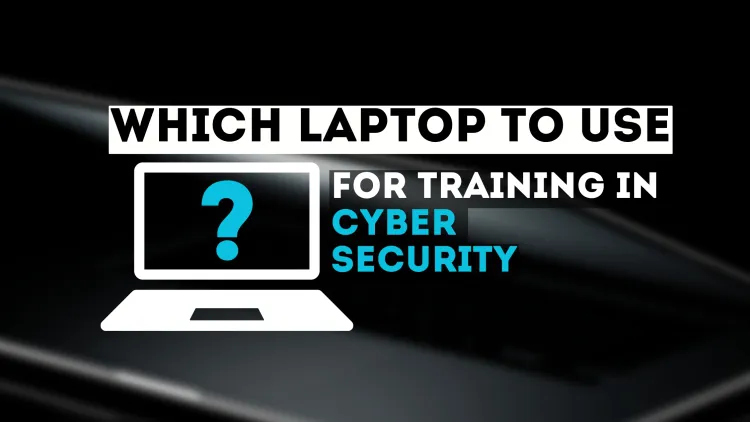Which Laptop is Ideal for Cybersecurity Studies? The Ultimate Guide
Choosing the right laptop for cybersecurity studies is crucial for success in the field. The ideal laptop should have a powerful processor, a minimum of 16GB RAM, SSD storage, and compatibility with Linux or the ability to run virtual machines. While dedicated GPUs aren't essential for most cybersecurity tasks, they can help with GPU-intensive tasks. Additionally, laptops with long battery life and ample storage are preferable. Some top laptops for cybersecurity studies include the Dell XPS 15, Lenovo ThinkPad X1 Carbon, and Apple MacBook Pro. Consider your budget, study requirements, and personal preferences when selecting the best laptop for your cybersecurity education.

When choosing the ideal laptop for cybersecurity studies, several factors should be considered to ensure that the laptop can handle the demanding nature of the field. Cybersecurity students often work with resource-intensive software for tasks such as penetration testing, ethical hacking, data analysis, and running virtual machines. Below are some of the key elements to look for in an ideal cybersecurity laptop and recommendations based on performance, durability, and budget.
Key Factors to Consider
-
Processor (CPU)
A powerful processor is essential for running complex cybersecurity tools, virtual machines, and simulations. Intel Core i7 or AMD Ryzen 7 and above are great choices for cybersecurity students. -
RAM
For multitasking and running multiple virtual machines or complex simulations, a minimum of 16GB of RAM is recommended. If you have the budget, opting for 32GB of RAM can provide better performance. -
Storage
SSD storage is preferred over HDD for faster boot times and efficient handling of large datasets. A 512GB SSD is the minimum, though 1TB SSD offers more space for software, tools, and data. -
Operating System Compatibility
Many cybersecurity tools are designed to run on Linux-based systems. Ensure the laptop supports Linux installation or comes with Linux pre-installed. -
Graphics Card (GPU)
Although not a priority for all cybersecurity tasks, having a dedicated GPU (like NVIDIA GeForce) can benefit certain tasks, such as running simulations or performing GPU-intensive operations. -
Battery Life
Cybersecurity students often work on-the-go, so long battery life is an essential feature to avoid frequent recharging during busy days. -
Build Quality and Security Features
Look for a sturdy, durable laptop with security features like a fingerprint scanner or TPM (Trusted Platform Module) chip. These features can provide additional security for your work.
Top Laptop Recommendations for Cybersecurity Studies
-
Dell XPS 15 (2025 Edition)
- Processor: Intel Core i7-13700H
- RAM: 16GB DDR5 (Upgradeable)
- Storage: 1TB SSD
- Display: 15.6" OLED 3.5K
- OS: Windows 11 (Linux-compatible)
Why It’s Ideal: The Dell XPS 15 offers a great balance of power and portability, ideal for cybersecurity tasks like penetration testing and running virtual environments. Its OLED display ensures clear visuals for coding and data analysis.
-
Lenovo ThinkPad X1 Carbon Gen 11
- Processor: Intel Core i7-1365U
- RAM: 16GB LPDDR5 (Upgradeable)
- Storage: 1TB PCIe SSD
- Display: 14" WQHD+
- OS: Linux pre-installed
Why It’s Ideal: Known for its durability and security features, the ThinkPad X1 Carbon is perfect for cybersecurity students who need reliable performance and easy Linux integration.
-
Apple MacBook Pro 14-inch (M3, 2025)
- Processor: Apple M3 chip (10-core CPU)
- RAM: 16GB Unified Memory
- Storage: 1TB SSD
- Display: 14.2" Liquid Retina XDR
- OS: macOS Sonoma
Why It’s Ideal: For those who prefer macOS, the MacBook Pro with its M3 chip provides seamless performance, long battery life, and is compatible with virtualization tools needed for cybersecurity studies.
-
ASUS ROG Zephyrus G14 (2025)
- Processor: AMD Ryzen 9 7945HX
- RAM: 16GB DDR5 (Upgradeable)
- Storage: 1TB SSD
- Graphics: NVIDIA GeForce RTX 4060
- Display: 14" QHD+ 165Hz
- OS: Windows 11 (Linux-compatible)
Why It’s Ideal: The ASUS ROG Zephyrus G14 is a compact gaming laptop that excels in performance. Its high-end specifications make it ideal for running multiple virtual environments and running cybersecurity tasks.
-
HP Spectre x360 16 (2025)
- Processor: Intel Core i7-13700H
- RAM: 16GB DDR5
- Storage: 1TB NVMe SSD
- Graphics: Intel Arc A370M
- Display: 16" 3K OLED Touch
- OS: Windows 11
Why It’s Ideal: This 2-in-1 convertible laptop is perfect for multitasking, offering great portability and performance. It is a versatile choice for cybersecurity students who need flexibility in their workflow.
Conclusion
The ideal laptop for cybersecurity studies should offer a balance of performance, compatibility, and security. Laptops such as the Dell XPS 15, Lenovo ThinkPad X1 Carbon, and ASUS ROG Zephyrus G14 are excellent choices, providing the power and features required for running cybersecurity tools and virtual environments. Depending on your budget and preferences, options like the Apple MacBook Pro and HP Spectre x360 can also be great choices. Ultimately, choosing the right laptop will enhance your learning experience and help you succeed in the field of cybersecurity.
FAQ:
-
What is the most important feature to look for in a laptop for cybersecurity studies?
The most important features include a powerful processor (like Intel Core i7 or AMD Ryzen 7), at least 16GB of RAM, fast SSD storage, and the ability to run Linux. -
Is 8GB of RAM sufficient for cybersecurity studies?
While 8GB can handle basic tasks, 16GB of RAM is recommended for running virtual machines and intensive cybersecurity tools. -
Can I use a MacBook for cybersecurity studies?
Yes, MacBooks can be used for cybersecurity studies. macOS is compatible with many cybersecurity tools, and you can also install Linux or use virtual machines for additional flexibility. -
Why is SSD storage preferred for cybersecurity tasks?
SSDs offer faster read/write speeds than traditional hard drives, making them ideal for handling large datasets and running multiple applications simultaneously. -
Do I need a dedicated GPU for cybersecurity studies?
A dedicated GPU is not necessary for most cybersecurity tasks, but it can be helpful for simulations or tasks that require GPU-intensive processing, like cryptography and decryption. -
What operating system is best for cybersecurity students?
Linux is highly recommended as it supports many cybersecurity tools. However, Windows and macOS can also be used with proper setup and software installations. -
How much storage is needed for a laptop in cybersecurity studies?
At least 512GB of SSD storage is ideal, but 1TB is recommended for storing large datasets, virtual machines, and cybersecurity tools. -
What type of processor should I look for in a laptop for cybersecurity?
For optimal performance, look for a laptop with at least an Intel Core i7 or AMD Ryzen 7 processor. These will handle the intensive nature of cybersecurity tasks. -
Is battery life important for a cybersecurity laptop?
Yes, a good battery life is important, especially for students who work on-the-go. A battery that lasts at least 8 hours is ideal. -
Can I install Linux on a Windows laptop for cybersecurity studies?
Yes, many Windows laptops allow you to dual-boot Linux, or you can run Linux in a virtual machine for cybersecurity tasks.











![Top 10 Ethical Hackers in the World [2025]](https://www.webasha.com/blog/uploads/images/202408/image_100x75_66c2f983c207b.webp)



![[2025] Top 100+ VAPT Interview Questions and Answers](https://www.webasha.com/blog/uploads/images/image_100x75_6512b1e4b64f7.jpg)







